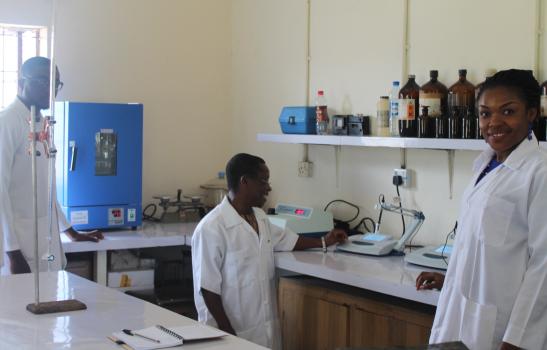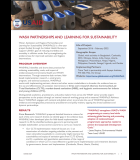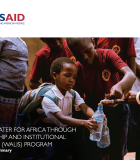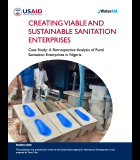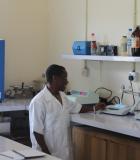Effective Water, Sanitation, and Hygiene Services in Nigeria (E-WASH)
USAID/Nigeria’s Effective Water and Sanitation Hygiene Services (E-WASH) project is an urban water and sanitation activity that will provide 500,000 families in six states access to a reliable supply of clean, piped water, to the benefit of three million Nigerians.
Under the four-year, $60.4 million E-WASH project, USAID will provide assistance to Abia, Delta, Imo, Niger, Sokoto, and Taraba states to improve the health and hygiene of their populations by improving delivery of water and sanitation services through stronger, better performing state water agencies.
The six states were competitively selected. The selection criteria included the state’s willingness to reform, existing functionality of infrastructure, and potential for positive impact.
Activity Description
E-WASH will improve the availability of clean water and sanitation in Nigeria’s poorest urban neighborhoods, with the aim of improving water delivery to 500,000 households by boosting the productivity and efficiency of Nigeria's State Water Boards (SWBs), many of which are balanced precariously between top-down government directives and an ongoing responsibility to deliver services to millions of customers.
E-WASH is taking a four-pronged approach to improving the viability of SWBs. The components of this approach include:
- Working with state governments and SWBs to build common understanding via facilitated, mutually agreed-upon Service Improvement Plans (SIPs)
- Making SWBs financially and operationally viable through comprehensive technical assistance and by connecting them to private-sector actors and successful utility operators, thus securing long-term funding and investment options
- At the state level, facilitating the creation or strengthening of regulatory oversight that will improve SWB transparency and accountability
- Engaging with civil organizations as advocates, as well as the donor community, to measure and adapt E-WASH activities, based on knowledge sharing and continuous learning
E-WASH will help address the often-overwhelming challenge of urbanization. Densely populated cities offer SWBs the opportunity to test innovative methods of revenue collection, such as e-billing and geographic information system (GIS) mapping of collection routes. If utilities can increase the numbers of businesses, industries, and households to which they distribute water, they can increase revenue, fund additional distribution, and increase the productivity of the Nigerian economy.
Expected Outcomes
- Improve the availability of clean water and sanitation in Nigeria’s poorest urban neighborhoods.
- Improve water delivery to 500,000 households by boosting the productivity and efficiency of State Water Boards.
- By learning international best practices in water management, SWBs will set Nigeria on the road to reliable and sustainable urban water and sanitation delivery in the near future.


